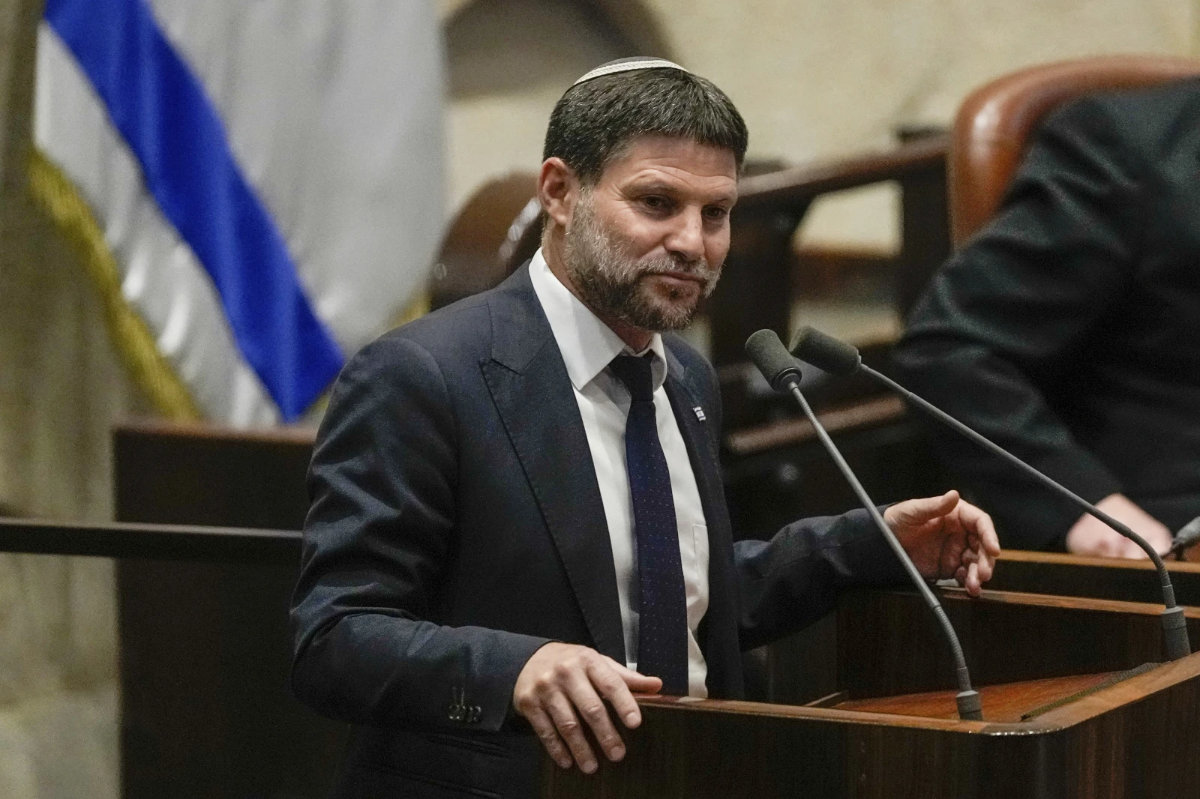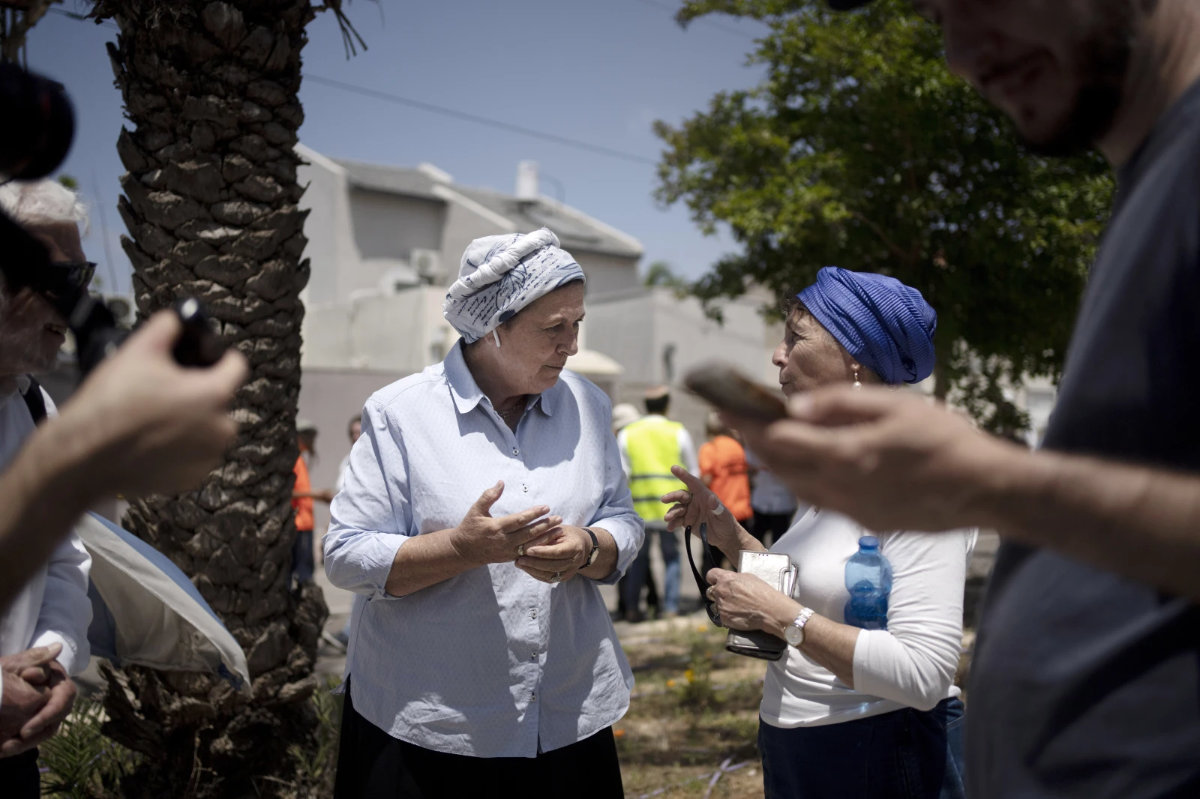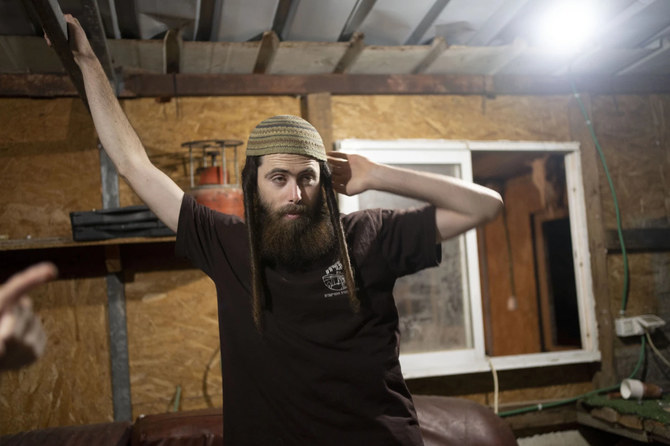SOUTH HEBRON HILLS, West Bank: For weeks after being sanctioned by the United States, Yinon Levi struggled to pay the bills, living at his farming outpost atop a hill in the occupied West Bank. But the Israeli settler’s problems didn’t last.
When the banks froze his accounts, his community raised thousands of dollars for him, and Israel’s finance minister vowed to intervene on sanctioned settlers’ behalf. Two months after sanctions were issued, Levi was granted access to his money.
“America thought it would weaken us, and in the end, they made us stronger,” Levi, 31, told The Associated Press from his farm in the South Hebron Hills — one of dozens of unauthorized settlement outposts dotting the West Bank.
Levi is among 13 hard-line Israeli settlers — as well as two affiliated outposts and four groups — targeted by international sanctions over accusations of attacks and harassment against Palestinians in the West Bank. The measures are meant as a deterrent, and they expose people to asset freezes and travel and visa bans.
But the measures have had minimal impact, instead emboldening settlers as attacks and land-grabs escalate, according to Palestinians in the West Bank, local rights groups and sanctioned Israelis who spoke to AP.
Sanctions prohibit financial institutions and residents in the issuing country from providing funds to a person or entity. In some cases, property is seized. Even though Israeli banks aren’t obliged to freeze accounts, many do so to maintain relations with banks — particularly for US sanctions — and avoid risk.
But for sanctioned settlers, the implications didn’t last long, with communities donating money and holding fundraisers making tens of thousands of dollars. And Israeli Finance Minister Bezalel Smotrich, a far-right settler leader, said he’d “take care of the issue” of people being sanctioned, Levi’s father-in-law, Noam Federman, told AP.
Smotrich said in a text-message statement that sanctions are “a grave mistake by the Biden administration.” He didn’t address questions about whether he intervened directly to unfreeze settlers’ accounts. But he said his actions to develop settlements are authorized, and the government is working with “our friends in the US” to cancel or reduce sanctions.

Israeli Finance Minister Bezalel Smotrich, a settler leader who lives in the West Bank, is part of the most right-wing governing coalition in Israeli history. (AP)
Israel seized the West Bank, Jerusalem and the Gaza Strip in the 1967 Mideast war. Some 500,000 Israelis have settled in the West Bank; the international community largely considers their presence illegal. But under Prime Minister Benjamin Netanyahu’s coalition — the most right-wing in Israeli history, with settlers themselves in key positions — expansion has been turbocharged.
Palestinians say expanding Israeli outposts are shrinking their access to land, and settler violence against them has soared since Hamas’ Oct. 7 attack that sparked the war with Israel. Land seized through unauthorized outposts has more than doubled since the war started, according to settlement watchdog Kerem Navot.
Palestinians living in small hamlets ringed by hilltop outposts say they fear it’s just a matter of time until they’re forced to leave their homes.
US officials have repeatedly raised concerns about surging settler violence, with President Joe Biden saying it had reached “intolerable levels” when announcing sanctions. Israel has said it’s calling for settlers to stand down and investigating violence. But rights groups accuse the government and army of complicity with the settlers.
In March, even the Israeli army complained about the extent to which the government intervenes on settlers’ behalf. An internal document, seen by AP and published by The New York Times, said the army is routinely denied authorization to act against illegal building by Israelis and regularly authorized to act against Palestinians.
REALITY OF SANCTIONS
Three sanctioned settlers — Levi, Federman and Elisha Yered — told AP the measures against them were, at most, an annoyance.
Levi founded Meitarim Farm in 2021 on a hill whose sloping sides give way to lowlands where Bedouin farmers graze sheep. He said he wanted to protect the area from being overtaken by Palestinians.
“Little by little, you feel when you drive on the roads that everyone is closing in on you,” he said. “They’re building everywhere, wherever they want. So you want to do something about it.”
Since then, anti-settlement activists say, more than 300 people from four nearby hamlets have been pushed off their land. Levi said the land is his and denies violently chasing anyone away.
US officials sanctioned him in February over accusations that from his outpost, he led settlers who assaulted Palestinians and Bedouins, threatened them, burned their fields and destroyed property.
Levi said his Israeli bank froze his accounts — holding nearly $95,000 — and within days, he couldn’t pay his mortgage or children’s school and activities fees.
Friends and relatives donated about $12,000 to him through April, he said, when the bank allowed him to withdraw on a controlled basis — he calls for permission and explains each transaction’s purpose.
An online fundraiser by the area’s regional council raised $140,000 for Levi from 3,000 donors worldwide. Following AP reporting on the fundraiser, the Mount Hebron Fund was also sanctioned by the US.
Since regaining access to his money, Levi said, he’s never been refused a request. The bank gave him a monthly limit of $8,000 in withdrawals, he said, but he nearly doubled that in the first few weeks.
In a clarification letter to Israel’s banks in March, the US Treasury said banks can process transactions for sanctioned people for basic needs such as food and healthcare, provided the transactions don’t involve the US financial system or US residents.
But Levi said he could buy whatever he wanted — he wouldn’t give specifics but said it wasn’t limited to “food or diapers.”
A US Treasury spokesperson didn’t respond to emailed requests for comment on Levi’s claims, sanctioned settlers and monitoring mechanisms.
The spokesperson for Bank Leumi, Levi’s bank and a major Israeli financial institution, didn’t respond to calls and messages seeking comment on the settlers’ accounts and transactions.
BEYOND SETTLER SANCTIONS
Local rights groups hope sanctions will be extended to Israeli government officials who they say embolden settler activity.
That would send a stronger signal of Washington’s condemnation, said Delaney Simon, of the International Crisis Group.
“Sanctions against government officials have cast a chilling effect in other countries, causing firms to shy away from doing business in those places,” she said.
Smotrich, who lives in the Kedumim settlement and was given special powers over settlement policies as part of the governing coalition agreement, told Israeli media in April that he’d take steps to help sanctioned settlers.
Levi’s father-in-law, Federman, told AP that he spoke to Smotrich directly.
“He said he will take care of it, and if necessary he will even make a law against interference of other countries in Israelis’ bank accounts,” Federman said. Shortly after, he added, his son-in-law’s account was unfrozen.
During a US congressional subcommittee meeting Tuesday with Treasury Secretary Janet Yellen, Sen. Chris Van Hollen of Maryland urged sanctions against Smotrich.
“This is in direct contradiction of US policy,” he said.
Yellen said she shared “concerns about what’s happening in the West Bank.” No action was taken in the meeting.
Britain sanctioned Federman, 55, in May over allegations that he trained settlers to commit violence against Palestinians, which he denied. He said he’d already had his wife open a separate account, after seeing others sanctioned.
He said he’s had no issues accessing money.
Israeli human rights lawyer Eitay Mack said that in addition to sanctioning settlers, the international community should target organizations funding settler expansion.
“If the international community is serious about the two-state solution, they have to tackle everything that gives the system money and legitimacy,” he said.
Activists cite groups such as Amana, which funds settlements and maintains oversight for some of Levi’s farm, according to a contract seen by AP. They also point to the group Nachala, which has a stated goal of enhancing West Bank settlement and has openly planned construction of unauthorized outposts.
Nachala is run by Daniella Weiss, a prominent figure in fringe Israeli efforts to resettle Gaza who’s regarded as the godmother of the settler movement.
“I’m not afraid of sanctions,” Weiss said. “The truth of the matter is that the United States wants us to be in Gaza because the United States does not want jihad to rule the world.”

Daniella Weiss (center), shown speaking with another woman in Sderot, southern Israel, on May 14, is regarded as the godmother of the Israeli settler movement. (AP)
EFFECTS FOR PALESTINIANS
Meanwhile, Palestinians in the West Bank say sanctions are mostly futile.
Eight Palestinians in two hamlets in the South Hebron Hills told AP they’re still being pushed off their land, with several alleging Levi has threatened them since being sanctioned.
One man said that in February, while out with his sheep, Levi held him at gunpoint, recounted all the places he’d forced people away, and threatened to kill him if he returned.
“He told me, ‘I displaced people from Zanuta to ad-Dhahiriya ... I am from the family of the farm of mad people,’” said Ahmed, who spoke on condition that only his first name be used, over retaliation fears.
Levi told AP the incident never happened.
Ahmed and other Palestinians said they are verbally and physically harassed, can’t move freely, and face intimidation by settlers circling their properties on motorbikes, cars or horses and spying via drones. A drone hovered overhead while AP was on the land; Palestinians say the buzzing is used to send sheep fleeing.
The few Palestinians who’ve refused to leave the area around Levi’s farm say their land has shrunk by 95% since he established Meitarim, crippling them economically.
In recent years, settlers have changed land-grabbing tactics, anti-occupation researcher Dror Etkes said: Rather than establishing residential settlements, they’ve turned to farming outposts, which use more land for grazing animals and spark more violence because they’re spread out, with high visibility.
Etkes said there’s been a total collapse of rule of law in the territory, with the Israeli government defending settlers.
Etkes said land Levi controls has nearly doubled since the war, from about 1,000 (400 hectares) to 2,000 acres (800 hectares).
And settlers say they’ll keep expanding.
In a makeshift clubhouse on a hilltop near the settlement of Maskiyot in the northern West Bank, Elisha Yered said he’s established five outposts since 2021. The most recent was built about a month before he was sanctioned by the European Union in April.
He’s a leading figure for Hilltop Youth — a group of Jewish teenagers and young men who occupy West Bank hilltops and have been accused of attacking Palestinians and their property. Hilltop Youth was also sanctioned by the UK and the EU.
The EU order said Yered, 23, was involved in deadly attacks on Palestinians. He was accused of involvement a 19-year-old Palestinian’s death last year.
Yered told AP the incident was one of self-defense over Palestinians attacking a herder and said he had nothing to do with his death. He was arrested in the case but never charged.
Yered is also sanctioned by the UK, which said he incited religious hatred and violence and called for Palestinian displacement.
Yered said that while the sanctions initially posed challenges accessing money, friends and family supported him. His credit card remains blocked, he said, but his bank lets him withdraw with permission.
He said nothing has halted his expansion goals.
“Only settling the land will bring security,” Yered said. “Anyone who thinks this will break us is mistaken. We’ve survived harder things than this.”




























